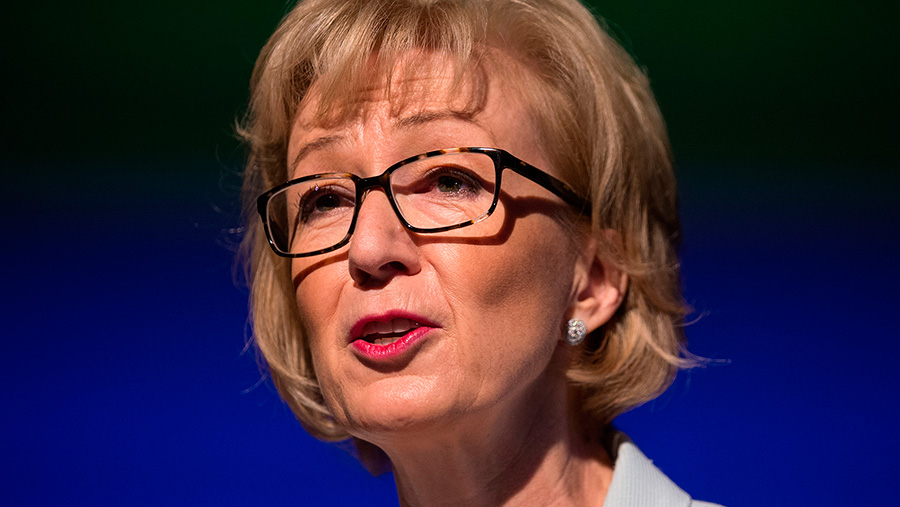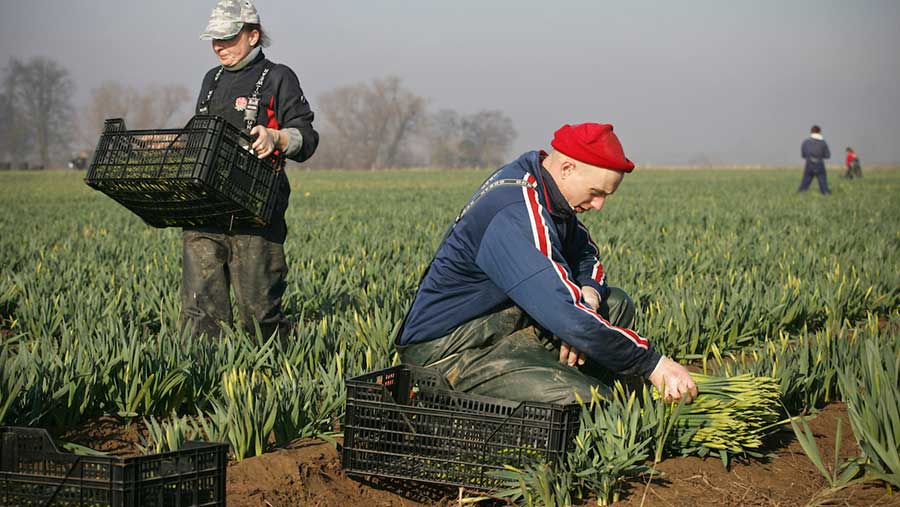Andrea Leadsom to set out post-Brexit vision for farming
 © Joel Goodman/LNP/REX/Shutterstock
© Joel Goodman/LNP/REX/Shutterstock Three months after becoming Defra secretary, Andrea Leadsom has the opportunity to spell out what Brexit means for farmers at the Conservative party conference starting on Sunday (2 October)
Defra secretary Andrea Leadsom is set to flesh out her post-Brexit vision for UK agriculture in a keynote address to the Conservative party conference in Birmingham.
But it is already clear that the industry can expect a more market-driven approach to agricultural policy as the government gears up for the UK to leave the EU.
Did you know?
- Born in 1963, she was brought up in Tring, Hertfordshire, by a divorced mother in a terraced house with an outside toilet
- A champion of early years development, Mrs Leadsom founded a charity to promote “parent infant psychotherapy”
- Mrs Leadsom is a committed Christian, telling the Daily Telegraph she participates in “various Bible studies groups” with other MPs
How much detail the speech will contain remains to be seen – despite having spent three months at the department, Mrs Leadsom’s office has so far declined requests for a one-to-one interview with Farmers Weekly until after the conference.
In her first major speech to the Tory faithful since her appointment to Defra, Mrs Leadsom will urge farmers to seize the potential benefits to agriculture and the wider rural economy from leaving the European Union.
Throughout her political career, Mrs Leadsom has made no secret of her desire to abolish farm subsidies.
During a lively debate at the London Palladium in the run-up to the EU referendum, Mrs Leadsom made much of her belief that the UK contributes much more to the EU than it receives back from Brussels – in financial terms at least.
“Net, we send £9bn a year to the EU, gross it’s £19bn. The remainder we get back in subsidies are things we have to beg for, things we have to co-finance, pet projects of the EU. So farmers, yes, they are supplicants asking for roughly 50% of the money they paid over in the first place.”
On voting to leave the EU, Mrs Leadsom said the UK government would “absolutely continue in the short term to provide these subsidies while we think about what makes sense… and some of the things that would make sense would be environmental trading credits”.
Farm payments
Since the vote in favour of Brexit, the government has pledged to maintain the existing level of direct payments until 2020. It has also pledged to honour agri-environmental agreements signed before the chancellor’s Autumn Statement scheduled for 23 November.
But while direct payments are safe for the next few years, the future for agri-environment schemes is much less clear. It is not certain, for instance, whether Countryside Stewardship will open for applications next year.
Political profile
- Mrs Leadsom attended Tonbridge Girls’ Grammar School before studying political science at Warwick University
- She was first elected to Parliament in 2010, and has represented the South Northamptonshire constituency ever since
- Having served as a junior energy minister, she ran for the Tory Party leadership before withdrawing and being appointed Defra secretary
Mrs Leadsom may well use her speech to clarify the government’s position on this issue.
Doing so would underline Defra’s commitment to the environment and allay fears that, as things stand, there may be no stewardship applications in 2017.
Despite the short-term certainty over direct payments – and the ongoing uncertainty over stewardship – it is increasingly clear that the government’s long-term strategy will require farmers to do more in return for financial support.
Market measuresIt is also clear that farmers will be more exposed to the marketplace.
A shift away from direct payments was signalled by Defra minister George Eustice when he attended this year’s Livestock Event at the Birmingham NEC soon after the referendum.
Alternative options being discussed included market measures and a renewed focus on agri-environment schemes, he said. Defra officials were also looking at risk management tools such as futures markets and crop insurance.
At the time, Mrs Leadsom had yet to be appointed Defra secretary. But Mr Eustice’s views have taken on an added significance since her appointment because the two politicians have worked together previously, launching the Fresh Start Group back in 2011 (see box).
As pro-Brexit campaigners, it is in the political interests of both Mrs Leadsom and Mr Eustice to show they can deliver a framework for agriculture that sees UK farmers and livestock producers thrive outside the EU, not just survive.
There are other reasons for optimism. Almost without fail, farm leaders have told Farmers Weekly that Mrs Leadsom is someone they can do business with – with many describing her as much more business-like than her predecessor Liz Truss, who was widely perceived as being lightweight.
Leadsom’s views on…
The CAP
“Think about those who are struggling to make ends meet because the EU’s protectionist agricultural policies add around £45 every month to their monthly grocery bill. Outside of the EU we won’t just be freer, safer and better off – our society can also be fairer.” (Mail Online, 1 June 2016)
Hill farming
“It would make so much more sense if those with the big fields do the sheep, and those with the hill farms do the butterflies. That would make a lot more sense for the UK and it is perfectly possible – but only if we leave the EU and sort it out for ourselves.” (Brexit debate, March 2016)
Migrant workers
“Immigration into our country is continuing to rise. With the inevitable pull factor of the National Living Wage, that can only increase – and it is the poorest Britons who will suffer the most.” (Mail Online, 1 June 2016)
Food imports
“Imported food must meet the same stringent health and animal welfare standards of British food. Subsidies must be abolished. The trade descriptions legislation that enables Country of Origin to be shown as the last country in which food was ‘processed’ must be changed.” (Blog, 28 February 2007)
Wind farms
“It is not often that I find myself in agreement with an idea from the EU. However, I completely welcome the announcement the European Commission made recently regarding the possibility of ending all subsidies for wind farms.” (Blog, 17 January 2014)
Climate change
“When I first came to this job one of my two questions was: ‘Is climate change real?’ and the other was ‘Is hydraulic fracturing safe?’ And on both of those questions I now am completely persuaded. But actually you have got to want to go and find out about it.” (As energy minister, October 2015)
The environment
“It is clear our wildlife still feels the impact today from the significant changes we saw in the 1970s and 1980s in the way that land was managed and used. But we are making progress. Investment and working in partnership is delivering improvements.” (State of Nature speech, September 2016)
Our farming future
“While much of our focus will understandably be on the future of farming when we leave the EU, we will not lose sight of the challenges we face now, such as low farm prices, the shortage of skills and apprenticeships and of course the scourge that is bovine TB.” (Farmers Weekly, 22 July)
Big fields and butterflies
During one Brexit referendum debate earlier this year Mrs Leadsom expressed the view that it would be better if “big fields do the sheep, and those with the hill farms do the butterflies”.
It might have been a comment aimed at a non-farming audience. But hill farmers – as well as other livestock producers and growers – will hope that Mrs Leadsom has developed a more sophisticated outlook for agriculture since making those remarks.

© Tim Scrivener
More positively, Mrs Leadsom has written about her belief that British food should have its own dedicated aisles in supermarket – in the past launching a campaign for home-grown food and “perhaps promote a ‘marque’ that all ‘healthy British food’ carries on the label”.
She also wants imported food to meet the same stringent health and animal welfare standards required of British food. And she wants country of origin rules changed so they more accurately describe where an animal was born and reared, rather than where it was slaughtered.
This, Mrs Leadsom says, is all now possible following Brexit. And she is likely to use her inaugural conference speech as Defra secretary to highlight her belief that leaving the EU is an opportunity for a “great revival of British farming”.
In a statement sent to Farmers Weekly after her appointment, Mrs Leadsom said: “While there is much to be done, I am enthusiastic and positive about the task ahead. British farming has a proud heritage and by working together, we can ensure it has an even greater future.”
A fresh start for farming?
Andrea Leadsom’s political interest in agriculture stretches back much further than her short time at Defra might suggest.
In 2011 – along with MPs George Eustice and Chris Heaton-Harris, Mrs Leadsom founded the Fresh Start group of Conservative MPs. In her own words, the aim was to “look in detail at every aspect of the EU” and see how it might be reformed.
A series of articles published by Fresh Start sheds light on Mrs Leadsom’s thinking when it comes to UK agriculture outside the EU. It suggests she believes financial support to farmers can be maintained, while ensuring food security and protecting the countryside.
Mrs Leadsom also believes that the government can reduce burdensome EU red tape, saving farmers time and making food cheaper. At the same time, she maintains that access can be improved to fast-growing international markets for British food producers.
Many politicians have made bold promises in a bid to gain power. Many too have found it impossible to turn those pledges into reality once they are in office. Farmers will be hoping Mrs Leadsom doesn’t fall into the latter category.
